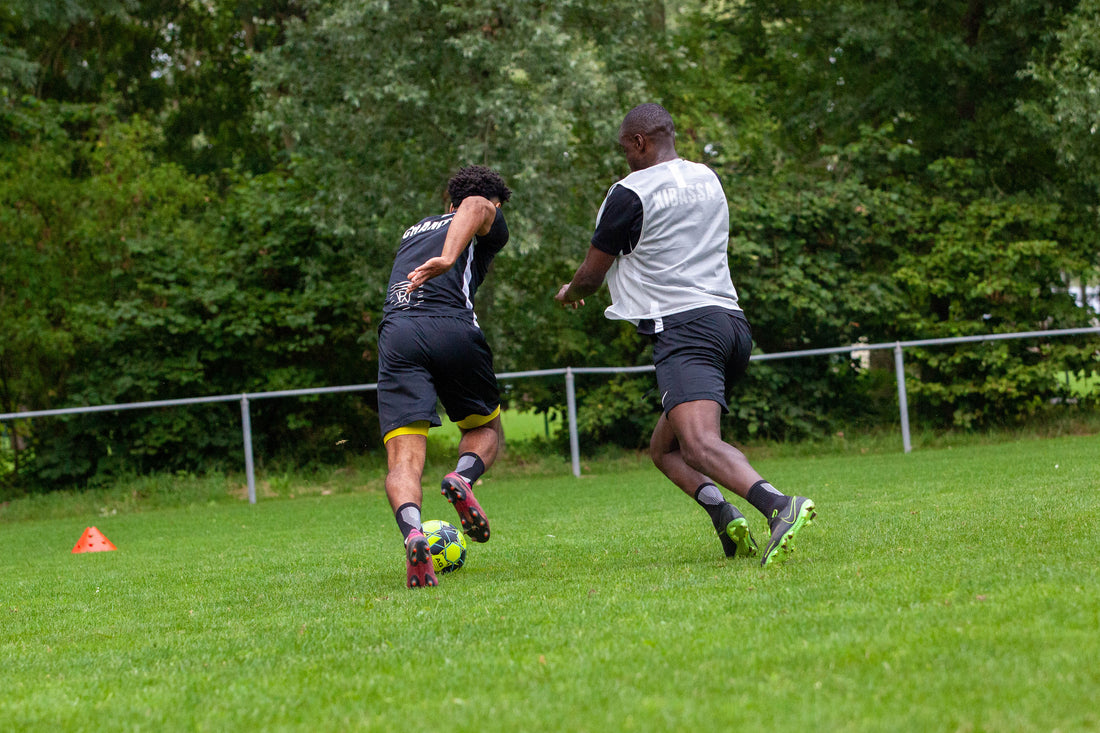
How long should the warm-up last?
Share
How do you feel about a warm-up? Something you'd rather skip? And the question is, why does warming always take so long? That is indeed a very good question, because do you actually benefit from a long warm-up? Does it ensure that your body is optimally prepared? Have you ever thought about how long your warm-up should actually take? We answer those questions! And the result may not be what you expect…
Traditionally, a (match) warm-up consists of 6 elements: you run, then warm up dynamically (in two rows to make it even more classic), make some passes, play a game of possession, kick a number of times towards goal and end with a few fixed sprints. In total it will take you about 35-45 minutes to do all that.
But is that really the best way to prepare your body for maximum performance? In this blog we will discuss the ideal duration of a warm-up in more detail.
What does science say?
As you might have expected, the traditional 35-45 minute warm-up isn't the best. Not for your body, but also not for your mental preparedness. What does science say? In 2019, Javier Yanci and his team investigated the influence of the length of warming on the following aspects:
-
Sprint
-
Jumping power
-
Changes in direction
-
Mental preparedness to start the competition
-
The degree of perceived exertion (RPE)
The study consists of different groups that each received 8 minutes, 15 minutes and 25 minutes of warming up. Before they started warming up, they all ran loose for 5 minutes. This time must therefore be included in the warm-up.
Physical performance
Let's start with the physical preparedness of the athletes according to the duration of the warm-up. You will find an overview in the table below. The players' performances on the 10m and 20m sprint were worse after a warm-up of 25 minutes and more! This means that after 5 minutes of warming up you can sprint faster than if you warm up for 25 minutes (or longer)! And let us guess, your warm-up takes longer than 25 minutes? Please note: we absolutely do not promote fully training or playing after 5 minutes of running. A short warm-up that increases in intensity is always crucial. Both to avoid injuries and to perform better.
So what does science say for shorter warm-ups? Javier Yanci also tested the sprint times when the athletes had warmed up for 8 and 15 minutes. No difference in sprint speed was noticeable after a 15-minute warm-up. But after a short, intense warm-up of 8 minutes, the difference was significant: on the 10m sprint and the 20m sprint, the athletes were on average 6 hundredths and 10 hundredths faster. If you know that the sprint speed of the average football player is 7.35m/s (just over 26km/h), then in a 20m sprint you are 73.5cm behind or ahead. This also includes whether you get to the ball earlier than your opponent. That's the difference between playing the ball or having the man. That can be the difference between sliding in a cross in time, or falling just 'a toe' short. The difference between tackling the ball from the opponent's feet or giving away a penalty. We will assist you to be on the winning side of the story.

Furthermore, no striking difference was measured for jumping power in this study. Other studies that analyzed a 35-minute warm-up did find a negative effect of too long a warm-up on the vertical jump power of athletes. A shorter intensive warm-up is also recommended to be able to jump higher.
Finally, for changes in direction the difference was minimal, but slightly in favor of the shorter warm-up. So time to think about your warm-up (and that of your team)?
Mentale impact
The mental preparedness to start the race was always better, no matter how long the warm-up took.
The degree of perceived exertion was greatest during the long warm-up of 25 minutes. This means that players experience that they have already had to put in more effort after a long warm-up compared to a shorter warm-up. That is a logical result.
Finally, we would like to advise you to literally warm yourself up mentally before you start the physical warm-up. Make sure you are calmly more focused. You have trained hard during the week to be ready, so there is no need for stress. Try visualization techniques to put yourself in the perfect mental mood.
Finally, it is best to warm up as shortly before the match as possible. The less time between warm-up and the start of the race, the better. So make sure that you have already done most of the preparations (shin guards, taking off socks, taking off jewelry, etc.) before you start warming up. When you return to the field after the inspection at the arbitration, it is best to do explosive exercises for about 2 minutes (sprints and jumping exercises) to reach your optimal performance level again.
In summary: a shorter, more intensive warm-up ensures that you will sprint faster, have better jumping power and experience less effort. What would such a warm-up look like? You will soon discover this in our latest e-book! We explain how to best prepare your body to perform optimally during the competition. And that preparation starts 2 days before the competition itself!
References
Andrade DC, Henriquez-Olguín C, Beltrán AR, Ramírez MA, Labarca C, Cornejo M, Ramírez-Campillo R. Effects of general, specific and combined warm-up on explosive muscular performance. Biol Sport. 2015;32(2):123–128.
Iturri, J., Castillo, D., Pardeiro, M. & Nakamura, F. Y. (2019). Influence of warm-up duration on perceived exertion and subsequent physical performance of soccer players. Biology of Sport, 36(2), 125–131. https://doi.org/10.5114/biolsport.2019.81114
Sander Gustin
